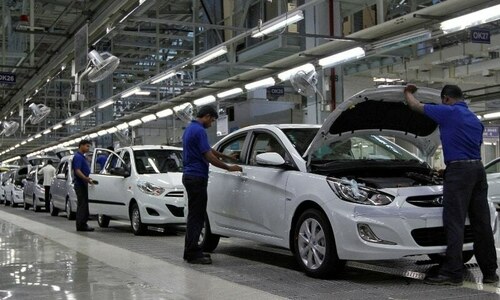More global firms apologise over tweets on Indian-occupied Kashmir

NEW DELHI: Global automaker Toyota Motor and fast food chain Domino’s Pizza are among half a dozen companies that have apologised to India for social media posts from their Pakistani partners expressing support for held Kashmir, as more companies got caught up in the diplomatic fracas.
The apology comes after a rare diplomatic escalation between South Korea and India on Tuesday over social media posts by Hyundai Motors’ Pakistani partner, which caused an uproar in India and calls to boycott the carmaker.
Japan’s Suzuki Motor, majority owner of India’s biggest carmaker Maruti Suzuki, Honda Motor and Isuzu Motor, South Korea’s Kia Motors and Yum! Brands’ KFC also issued apologies as criticism grew on Twitter over the social media posts.
The affray highlights the risks global companies face while navigating sensitivities amid rising nationalism in South Asia, and is prompting them to take steps to strengthen their social media policies to protect their brand.
The row erupted on Sunday, a day after several companies posted messages on social media to mark Kashmir Solidarity Day, commemorated annually by Pakistan on Feb 5 to honour the sacrifices of Kashmiris struggling for self-determination. Toyota, the world’s biggest carmaker, said on Twitter that any political statements made by its dealers or other partners were not authorised and do not reflect its corporate stance.
“We regret any hurt this may have caused,” the company said, adding it was putting in place measures to prevent the misuse of its brand and a recurrence of such situations.
Suzuki issued a similar apology, adding it does not align with any political or religious groups.
Hyundai, India’s second-largest car seller, faced the most severe backlash with hundreds of social media users calling for an apology. Dozens in India also said they would cancel their car orders. The automaker apologised on Tuesday, saying it deeply regretted any offence caused to Indians.
Yet, dozens of members of the youth wing of India’s opposition Congress party gathered outside one of Hyundai’s showrooms in the western city of Ahmedabad in protest.
Some held banners saying “Boycott Hyundai” and demanded the company tweet that Kashmir is an integral part of India.
“We are protesting against Hyundai’s comments on Kashmir, its attempts to disturb the peace in India and for the sacrifice our soldiers have made to protect Kashmir and the nation,” said Gaurang Makvana, a member of the youth Congress.
Published in Dawn, February 10th, 2022













































